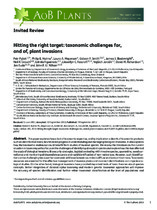Hitting the right target: taxonomic challenges for, and of, plant invasions

View/
Date
2013Author
Pysek, Petr
Hulme, Philip E.
Meyerson, Laura A.
Smith, Gideon F.
Boatwright, James S.
Crouch, Neil R.
Figueiredo, Estrela
Foxcroft, Llewellyn C.
Jarosık, Vojtech
Richardson, David M.
Suda, Jan
Wilson, John R.U.
Metadata
Show full item recordAbstract
This paper explores how a lack of taxonomic expertise, and by implication a dearth of taxonomic products
such as identification tools, has hindered progress in understanding andmanaging biological invasions. It also explores
how the taxonomic endeavour could benefit from studies of invasive species. We review the literature on the current
situation in taxonomy with a focus on the challenges of identifying alien plant species and explorehowthis has affected
the study of biological invasions. Biosecurity strategies, legislation dealing with invasive species, quarantine, weed surveillance
and monitoring all depend on accurate and rapid identification of non-native taxa. However, such identification
can be challenging because the taxonomic skill base in most countries is diffuse and lacks critical mass. Taxonomic
resources are essential for the effective management of invasive plants and incorrect identifications can impede ecological
studies. On the other hand, biological invasions have provided important tests of basic theories about species
concepts. Better integration of classical alpha taxonomy and modern genetic taxonomic approaches will improve
the accuracy of species identification and further refine taxonomic classification at the level of populations and genotypes in the field and laboratory. Modern taxonomy therefore needs to integrate both classical and new concepts
and approaches. In particular, differing points of view between the proponents of morphological and molecular
approaches should be negotiated because a narrow taxonomic perspective is harmful; the rigour of taxonomic decision-
making clearly increases if insights from a variety of different complementary disciplines are combined and confronted.
Taxonomy plays a critical role in the study of plant invasions and in turn benefits from the insights gained from
these studies.
